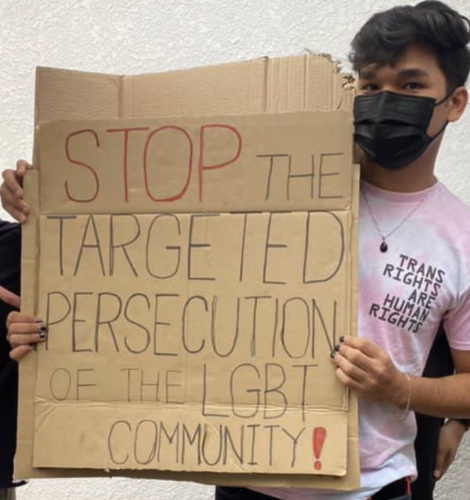Exclusion or Inclusion?: The LGBT Community in Malaysia

Exclusion or Inclusion?: The LGBT Community in Malaysia
It is no secret that Malaysia is not queer-friendly. Same-sex sexual activity is criminalized under Section 377 of the 1936 Penal Code, state-funded conversion therapy is widespread, and transgender folks live in grave precarity. However, recent developments in legal cases and popular discourse have shown both progress and regression of attitudes towards the LGBTQ community. More Malaysians want tolerance and privacy, but many believe that legal protections are a pipe dream.
Progress, maybe.
In February 2021, a man who allegedly attempted gay sex in 2018 won a landmark court challenge against Selangor’s Sharia Court. Malaysia’s Federal Court ruled that the state judiciary could not enact some aspects of criminal law. Since state courts tend to be more zealous in prosecuting Malaysians, this legal precedent prevents abuse of the state judiciary and provides some protection to queer folks.
In January 2023, two prominent Islamic muftis issued an advisory against dispensing pre-exposure prophylaxis (PrEP) to queer patients. The muftis argued that in doing so, pharmacists would encourage “deviant” behaviours and become complicit in their patients’ sins. The Malaysian Pharmacist Society stated they have a medical responsibility to prescribe PrEP to patients who need it because HIV prevention can only occur with “non-religious” intervention.
In September 2023, Prime Minister Anwar Ibrahim publicly stated that the LGBTQ community should be free from harassment during an interview with CNN’s Christiane Amanpour. However, Ibrahim argued that recent anti-LGBTQ reactions (discussed below) were the “consensus of the people” which he did not want to challenge. Amanpour was perplexed at his lack of protection for the queer community, given that he was (falsely) charged with sodomy and imprisoned twice. Anwar stated that the law should not be abused for political persecution but failed to mention any tangible legal steps to prevent harassment based on sexual orientation.
Regression, definitely.
In October 2022, a Halloween rave at RexKL, a popular nightclub in Kuala Lumpur, was raided by the police. The event, Shagrilla, was cut short and eighteen people were arrested for “cross-dressing.” All detainees were subject to degrading questioning about their medical history (hormone pills and gender-affirming surgery). Fortunately, all persons have been released on bail but await further legal action. This event aimed to foster community and joy among the queer community, but ended up being a memory of fear and trauma.
In May 2023, the Home Ministry illegally seized 172 watches from the Swiss-owned Swatch shops in Malaysia because these watches were products from Swatch’s “Pride Collection.” The Ministry argued that all entities are subject to the Prohibition Order, which prohibits publications that harm morality, public interest, and the state’s interest. To make matters worse, selling or owning an item from this collection could be punishable by up to 3 years in jail and a fine of up to RM20,000 (USD4,376). Swatch has filed a lawsuit against the Malaysian government. The trivial nature of rainbow-coloured watches triggered the government to act so harshly, demonstrating the government’s fragility of its control.
In July 2023, the Ministry of Communications and Digital banned the continuation of the Good Vibes Festival because of an on-stage same-sex kiss and disrespectful remarks about Malaysia’s anti-LGBTQ laws. Before kissing his band member, Matt Healy, the lead singer of The 1975, called the Malaysian government “f****** retards” for “telling us who we can have sex with.” As a result, the Ministry cancelled the following two-day line-up of international artists to make a stand “against any parties that challenge, ridicule or contravene Malaysian laws.” This incident questioned not only the freedom to express one’s sexuality but also the freedom of speech. Nonetheless, many local queer activists viewed this “performative activism” as harmful because it heightened the visibility of queer folks during a tenuous election campaign season, which leveraged Islamic fundamentalism and anti-LGBTQ sentiments.
Tolerance and Privacy
All of these front-page incidents have caused many urbanites to believe that the government and religious officials are too concerned about policing queerness and not concerned enough with actual governance. It’s a sexy distraction from the more insidious issues of corruption and bureaucratic incompetence. Nonetheless, there persists some form of genuine tolerance for the LGBTQ community because people refrain from discussing bedroom matters generally. Even within most family circles, queerness is somewhat tolerated but not openly discussed or embraced. However, I would argue, this tolerance might also be a result of fatigue from the anti-LGBT discourse. As my mother would say, “Enough, la! It does not concern you and their [LGBTQ folks] sin is between them and God.”
But very few call for legal protections, acknowledgements and accommodations because they are fighting more urgent battles: survival and recognition. At present, anti-discrimination laws do not exist to protect against discrimination based on gender and sexual orientation. Most activist organizations, such as Justice for Sisters and Jejaka, aim to provide legal counsel, medication and shelter to queer and trans people. Therefore, few resources are funnelled to political lobbying and diversity education/training.
I hope for Malaysia and Malaysians to recgonize that the LGBTQ community is as much a part of the nation as they are. As citizens, they should be protected and cared for by the government they elect and pay taxes to. More importantly, I hope Malaysians will put on more compassion and empathy to recognize the humanity in others and realize that queer people are people too.
Sources:
-
https://www.hrw.org/news/2022/08/10/malaysia-state-backed-discrimination-harms-lgbt-people
-
https://www.hrw.org/news/2021/02/25/malaysias-highest-court-strikes-down-state-gay-sex-ban
-
https://www.ilgaasia.org/news/raid-malaysia-shrinking-civic-spaces-2022
-
https://www.cnn.com/style/article/malaysia-swatch-ban-rainbow-lgbt-watch-intl-hnk/index.html